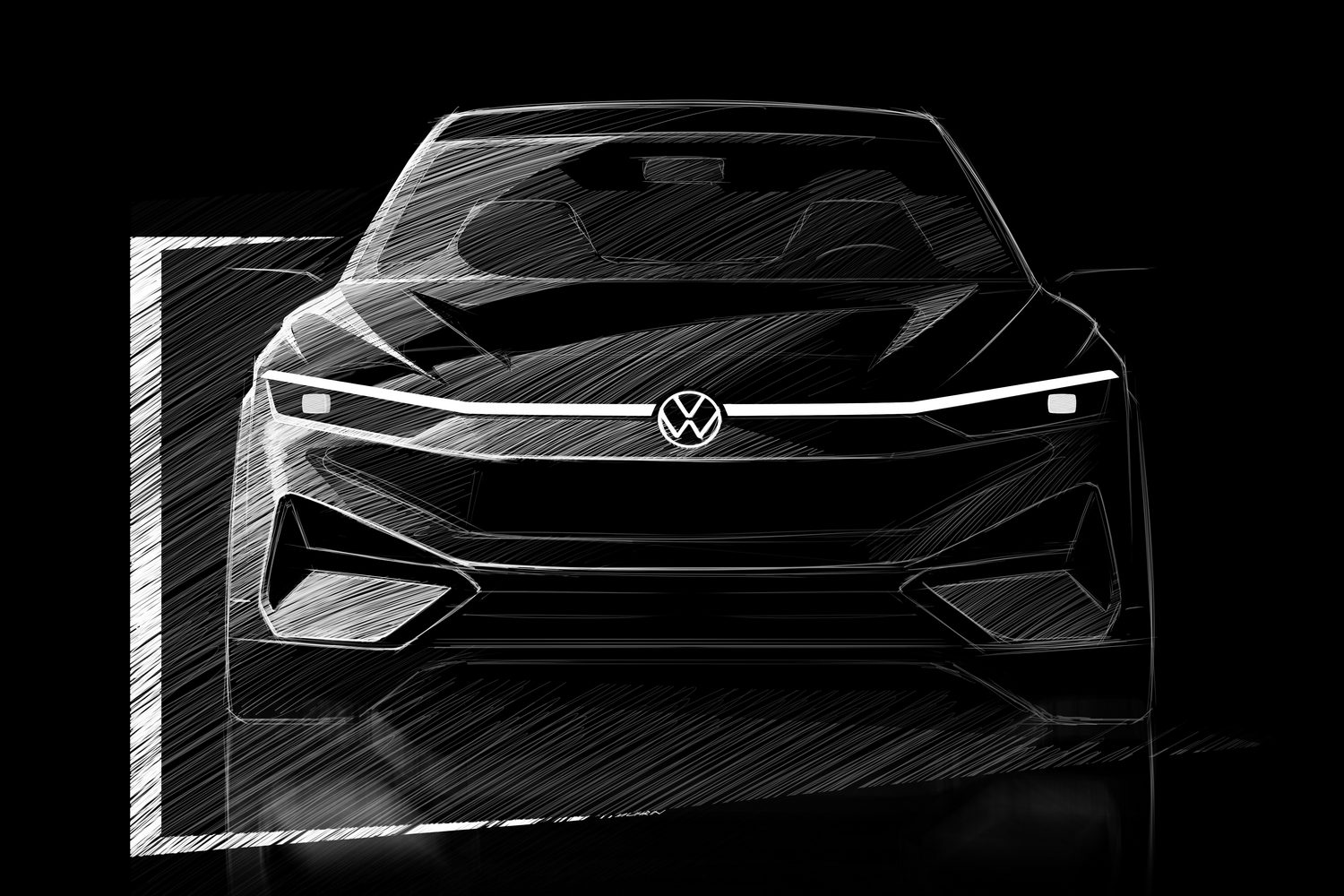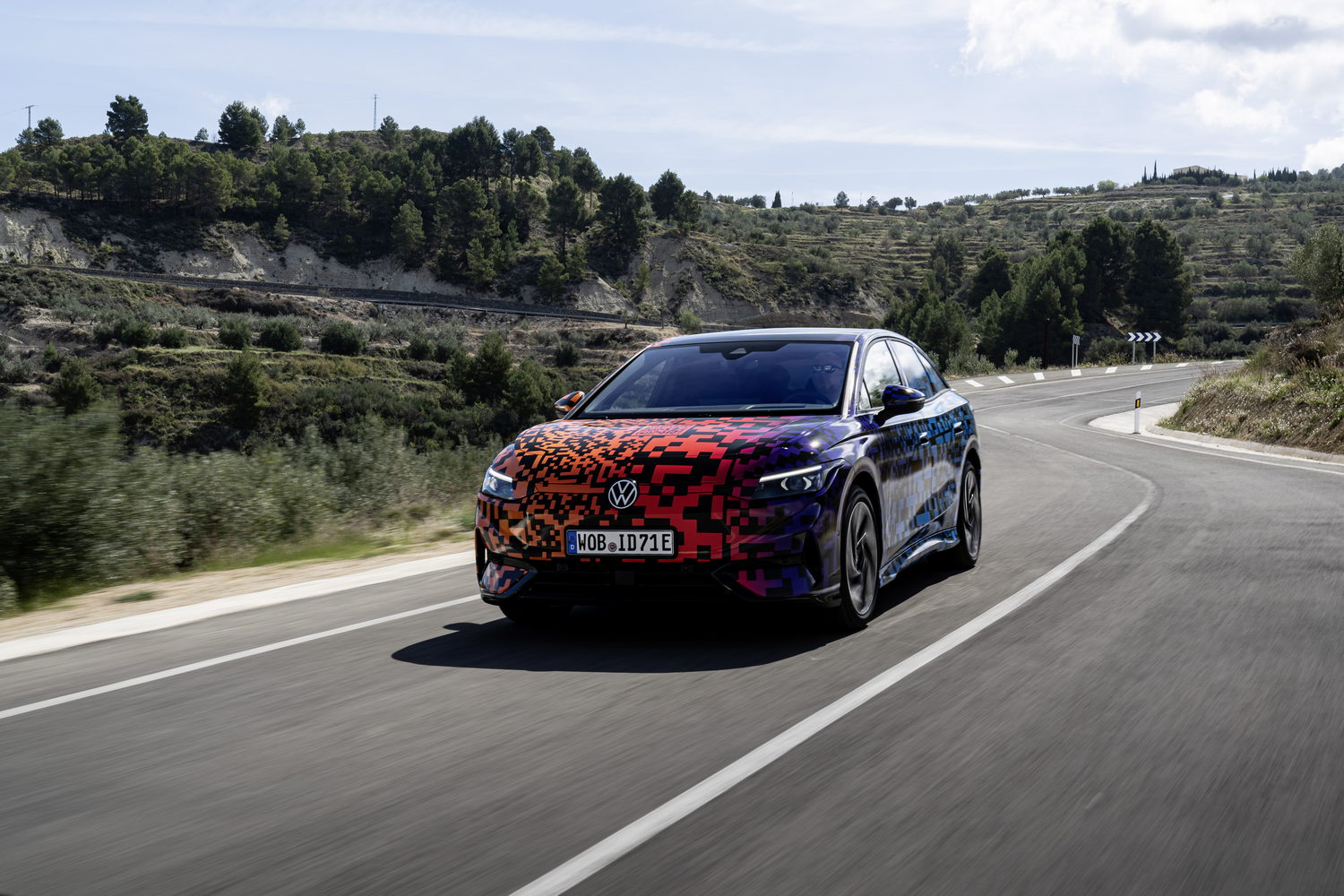Volkswagen has confirmed more of the technical details of the upcoming new ID.7 electric saloon, which will go on sale later this year in Ireland before its first full year of sales in 2024.
The most important fact that we've been given so far is that the ID.7 will be the first Volkswagen ID. model with a battery bigger than 77kWh. The new bigger battery pack will have a useable capacity of 86kWh, and will give the sleek and low-slung ID.7 a one-charge range of as much as 700km. That will be for the top-spec ID.7 Pro S version.
615km for the standard model
There will be a more affordable version, badged ID.7 Pro, which will come with the 77kWh battery pack familiar from the ID.4 and ID. Buzz, and which, thanks to the ID.7's aerodynamics, will have a one-charge range of around 615km. Both of those range figures are approximate for the moment, but should be close to what the final WLTP tests will come out at.
Part of that long range comes from the sleek profile of the ID.7, which has a drag coefficient of just 0.23. It's a lot sleeker than that of a Volkswagen ID.4, which has a maximum range of 535km with the same 77kWh battery pack.
The ID.7 gets some neat aero tricks to help it achieve that figure, including 'air curtains' that put a screen of high-speed air in front of and over the tyres to help quell turbulent air flow kicked up by the wheels, while the flared-out edges of the door sills help prevent unwanted airflow getting into the flat underbody - rather like a ground-effect F1 car.
The ID.7's electric motor is also more efficient. So far, the only powertrain option announced is a single, rear-wheel-drive, three-phase permanent magnet synchronous motor unit rated at 210kW - or 286hp. There will likely be a four-wheel-drive higher performance version announced in the coming months, which may be badged GTX, in line with the existing ID.4 GTX.
That electric motor gets a number of technical tweaks to improve its efficiency, including a rotor with stronger permanent magnets that offer high thermal load capacity, a further-developed stator with a larger effective number of windings in combination with maximum wire cross-section, as well as a water heat sink for the outside of the stator and a new, combined oil and water cooling system that is also designed to ensure high thermal stability. It's the most powerful single electric motor yet for a Volkswagen ID model.
The inverter - which converts electrical energy back and forth between DC and AC power - has also been made more efficient, while VW says that frictional losses in mechanical components have been reduced.
The ID.7 will also get improved charging speed compared to the current ID range. At launch, the ID.7 Pro will be able to charge at up to 170kW on a DC fast charger, while further down the line the ID.7 Pro S will be able to charge at 200kW.
While the MEB electric car platform under the skin is closely related to that of the ID.4 and ID.3, VW says that it has worked hard to give the ID.7 a good spread of both agility and comfort, thanks in part to specifically tuned, high-damping elasto-kinematic mounts on the rear axle. The ID.7 will be available with VW's DCC adaptive damping system as well, and upgraded steering.
Roomy cabin
Inside the ID.7, there should be plenty of room front and rear thanks to a 2.9-metre wheelbase, while up front the main digital instruments have been reduced in size, and indeed in importance, in favour of a large head-up display projected onto the windscreen. The 15-inch touchscreen in the centre of the dash, we are told, has much improved software and controls and the oft-controversial 'slider' temperature controls below are now backlit so that they can be used at night. Meanwhile, to make life easier, the settings of the air conditioning system and access to the seat heating, seat ventilation and seat massage functions are shown at all times on the bottom of the display.
It's a big car, the ID.7, stretching to almost five metres (it's actually 4,961mm to be precise - about 200mm longer than a Volkswagen Passat) with a 532-litre boot.
Doubtless, given its electric power, the ID.7 will be a very quiet car inside, but VW has assured us that it can be noisy, thanks to an optional 700-watt Harmon-Kardon sound system with 14 speakers and a sub-woofer in the boot. The 16-channel system offers four preconfigured sound settings: Pure (neutral studio sound), Relax (easy listening), Speech (focus on spoken words) and Vibrant (dynamic live sound).
The surround sound function should be impressive - Harmon Kardon uses the Fraunhofer Sonamic Panorama algorithm, which is said to clearly separate individual instruments, voices and sound sources in a piece of music and arrange them on a U-shaped sound stage that surrounds all passengers.
While your ears are assaulted, your buttocks can be massaged - top-end ID.7 models will get 14-way electric adjustable 'ergoActive' front seats with heating, ventilation and ten air cushions in the backrest that provide a pneumatic pressure point massage. The goal is to relax and activate the back muscles. The ergoPremium seats have two additional large air cushions in the seat cushion. The goal here is to activate the pelvis and spine.
Indeed, so apparently good are these seats that they have a seal of approval from the independent German Campaign for Healthier Backs (AGR). Ulrich Kuhnt, AGR expert advisor, said: "The spine is the central axis organ. If it moves, the whole body from head to foot also moves. The activation system integrated in the seat makes use of this anatomic characteristic. It prevents muscular tension in the back, enhances the general feeling of well-being and increases the user's concentration on the traffic."
Smart air conditioning
The ID.7's air conditioning system is also clever - there are little motors for the main air vents, which can be used to waft warm or cold air around the cabin to the areas where it's most needed. VW says that the system is free from drafts, and that it starts working as soon as the driver approaches the car with the key. You'll be able to use voice control as well, such as telling the car "Hello ID, my hands are cold" and it'll start blowing warm air through the vents behind the steering wheel (as well as presumably turning on the heated steering wheel).
Full production of the ID.7 will kick off in June at VW's factory in Emden, in north-west Germany just the other side of the Ems estuary from The Netherlands. The plant already builds the ID.4, and Volkswagen has made a €1 billion investment to get ID.7 production up and running there. A second factory in North America will also build the ID.7, starting later this year.
For the moment, VW is only showing us images of the ID.7 still in its multi-coloured camouflage wrap. The final, finished car will be revealed to the world in the summer.



























